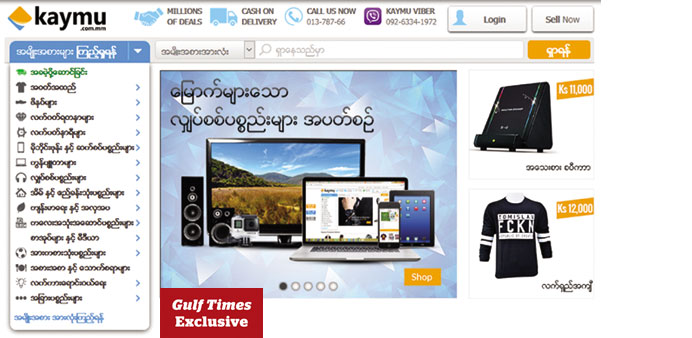A screenshot of kaymu.com.mm, one of six online portals in Myanmar set up by Ooredoo and Rocket Internet-backed Asia Pacific Internet Group.
By Arno Maierbrugger/Gulf Times Correspondent/Bangkok
Myanmar is one central focus country for German e-commerce incubator Rocket Internet, which cooperates with Qatar’s telecom giant Ooredoo in launching Internet businesses throughout Asia. The two companies, via their joint venture Asia Pacific Internet Group, have already successfully set up no fewer than six e-commerce startups in the country, namely house.com.mm (property portal), motors.com.mm (car portal), ads.com.mm (portal to sell used items and offer services), work.com.mm (job portal), kaymu.com.mm (online shopping mall for buyers and sellers) and shop.com.mm (online retail and wholesale shop, a version of the daraz.pk online store the company rolled out in Pakistan earlier). Another portal – hotel booking site jovago.com.mm – will follow shortly, according to Jovago CEO Paul Midy, as “a direct response to the growing demand of tourism and need for online hotel bookings” in Myanmar, as well as in neighbouring Bangladesh, where Jovago will also launch a country-specific site.
“Now is a good time to set foot in these markets, since the tourism sector is determined to evolve,” Midy said.
The many new Internet ventures by Asia Pacific Internet Group in Myanmar are built upon the expectation that e-commerce is about to experience a massive boom in the country which is just in an early cycle of “getting connected” after it opened up to the outside world only a few years ago when there was literally no Internet or mobile data infrastructure, at least for the common people. While currently still not more than approximately 5% of the 53 million-population are online and prospects for e-commerce seem to look tough, this rate is expected to go through the roof once firms such as Ooredoo will have rolled out their mobile broadband network and provide the necessary infrastructure. For Myanmar, where Internet and smartphones for the first time have become accessible and affordable for many people and where thousands are going online for the first time every day, this is going to cut short a decade of the normal evolution towards e-commerce like in other, non-frontier markets. New virtual marketplaces in a transitioning economy such as Myanmar’s also bring new opportunities for vendors, shopkeepers and entrepreneurs to open up online stores, while brand retailers are becoming able to reach out to a completely new client base that lives outside the bigger cities and seldom, if at all, visits brick-and-mortar shopping complexes.
Ooredoo predicts that 97% of Myanmar’s population will have access to the company’s 3G network by 2018. Market research forecasts that there could be more than 38mn internet users in Myanmar as early as by 2016, which would represent an Internet penetration of over 60%, up from 1.2% in 2012, expected to give e-commerce in the country a heavy boost. The only thing that holds back an even faster development in e-commerce is the hurdle of Myanmar’s cash-based society where credit card use is not at all common, let alone for Internet shopping, which currently makes online payments difficult. Currently, most e-commerce deals are cash-on-delivery based. This problem will be removed by the roll-out of simple-to-use mobile payment systems, a step seen the next big driver for building up an e-commerce ecosystem in Myanmar.
Asia Pacific Internet Group has about $225mn to invest in start-ups over the next two to three years, according to its Co-CEO Hanno Stegmann, who said that most of the funds will go into e-commerce and consumer Internet businesses in emerging and frontier economies all over Asia.

